 Petzlover
Petzlover Both Cymric and Devon Rex are originated from United Kingdom. Both Cymric and Devon Rex are having almost same weight. Both Cymric and Devon Rex has almost same life span. Cymric may have less litter size than Devon Rex. Cymric requires Moderate Maintenance. But Devon Rex requires Low Maintenance
Both Cymric and Devon Rex are originated from United Kingdom. Both Cymric and Devon Rex are having almost same weight. Both Cymric and Devon Rex has almost same life span. Cymric may have less litter size than Devon Rex. Cymric requires Moderate Maintenance. But Devon Rex requires Low Maintenance
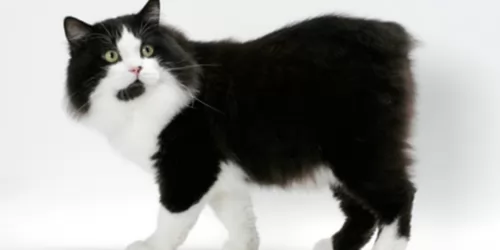 The Cymric is a naturally tailless cat although having said that, not every Cymric is completely tailless.
The Cymric is a naturally tailless cat although having said that, not every Cymric is completely tailless.
It’s actually a long-haired Manx cat this and thought to date back to 1750. It is one of the oldest cat breeds.
Known also as rumpies or stumpies, the taillessness of the Manx an Cymric started as a mutation among the island's domestic cat population. Long-haired kittens were born to Manx cats on the Isle of Man, but in the 1960s, similar kittens were born in Canada and then specifically bred.
The Cymric became popular, even though it took years for the Cymric to be recognized as a breed of its own by cat associations. The International Cat Association (TICA) gave the cat breed status in 1979.
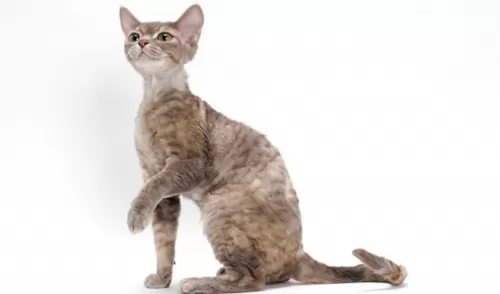 The Devon Rex is a cat known for its large ears and its curly, soft coat. It hails from England, emerging in the 1950s.
The Devon Rex is a cat known for its large ears and its curly, soft coat. It hails from England, emerging in the 1950s.
The cat is recognized by quite a few cat associations. The first of these cats was discovered by Beryl Cox in 1959 in Buckfastleigh, Devon. When the cat started appearing in cat shows in the UK, people starting becoming interested in owning these unusual cats.
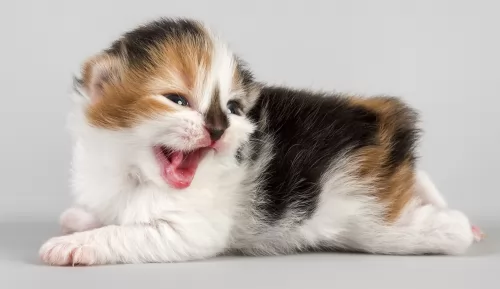 The Cymric is a medium-sized cat that can weight between 4 and 6kg and he is round in shape and stockily built. The back legs are also longer than the front legs.
The Cymric is a medium-sized cat that can weight between 4 and 6kg and he is round in shape and stockily built. The back legs are also longer than the front legs.
He has a short, arched back with a broad rump. The unusual but beautiful Cymric has long hair and a thick double coat that is glossy and vibrant. Some cymrics have tufts of hair on their ears and toes.
All colors of the coat are available and it can be solid or patterned - white, blue, red, black, cream, tortoiseshell etc.
The eyes are large and can be green, copper, or yellow. The ears are widely spaced with rounded tips.
The Cymric is described as a sweet-natured, placid cat that doesn’t get ruffled over much, though he does get excited about his human family.
He tends to be reserved around strangers. He is a loving cat and simply loves being around his human family. He is a strong cat and intelligent too and he is quite capable of watching you and then learning how to open doors and get into cupboards.
He is sociable and talkative too and enjoys ‘talking’ to you, especially when he has attached himself to one member of the family. He thrives on his human family's company and is a cat that provides lots of entertainment for you. Even though he becomes attached to one family member, he gets on well with children and pets in the home.
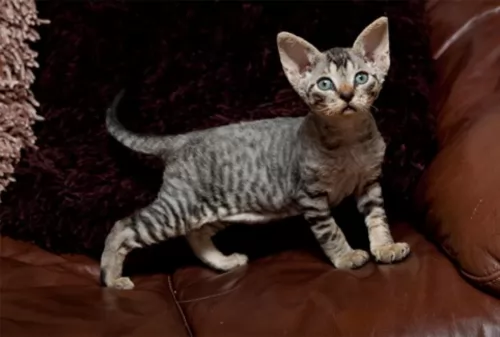 Known for its slender, light build, and weighing roughly between 2 and 4kg, the medium-sized Devon Rex has large, rounded ears. It is the large, rounded ears, set low on the sides of the broad head that make it slightly gremlin-like in appearance.
Known for its slender, light build, and weighing roughly between 2 and 4kg, the medium-sized Devon Rex has large, rounded ears. It is the large, rounded ears, set low on the sides of the broad head that make it slightly gremlin-like in appearance.
Their eyes are also large, and their noses are slightly upturned. It’s short, curly coat is another unusual feature and comes in many colors and patterns. The eyes can be blue, yellow, copper or he can be odd-eyed.
Your Devon Rex is quite a naughty cat, enjoying getting up to all kinds of mischief. Energetic, they love leaping up high onto perches so you’ll often find your Devon Rex in odd spots, more so if it's a spot in the sun as he loves warmth. It is why it is important to buy a cat tree for this cat.
It’s a loving, loyal cat and it will attach itself to one member of the family and then they are capable of pouring out the love and affection on this particular person. They’re also playful cats, as well as being intelligent.
He can learn a few tricks and can also be trained to walk on a leash. This is an active, energetic breed and will provide his human family with hours of amusing entertainment.
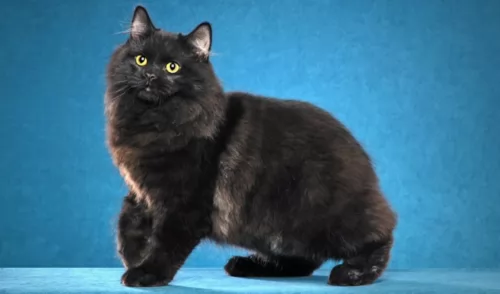 Yes, the Cymric has quite a few health issues but many people choose to overlook these as they love the personality of the lovable cat breed.
Yes, the Cymric has quite a few health issues but many people choose to overlook these as they love the personality of the lovable cat breed.
It’s such an intelligent cat too but best of all it offers total love and companionship.
It is certainly an unusual domesticated cat breed that appeals to many different people and it is guaranteed that you’ll also find him one hang of a feline pet.
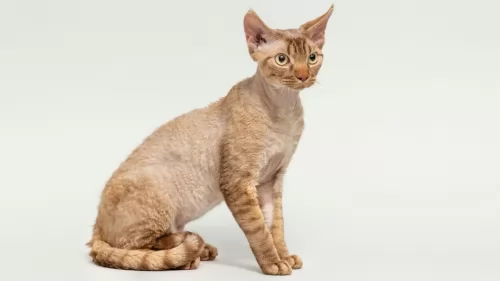 Your Devon Rex is a social cat and is happy to be found on your lap. He doesn’t take kindly to being left on his own though. He isn’t a suitable fit for someone who works all day.
Your Devon Rex is a social cat and is happy to be found on your lap. He doesn’t take kindly to being left on his own though. He isn’t a suitable fit for someone who works all day.
If you love animals, then maybe another companion animal would be a good idea as he is an amicable cat and gets on well with other animals.
When you spend time with your cat, make sure it is a special time, full of treats and stimulating play as he will learn to even fetch a small ball.
Just give him lots of attention and he’ll be your provider of companionship and entertainment.
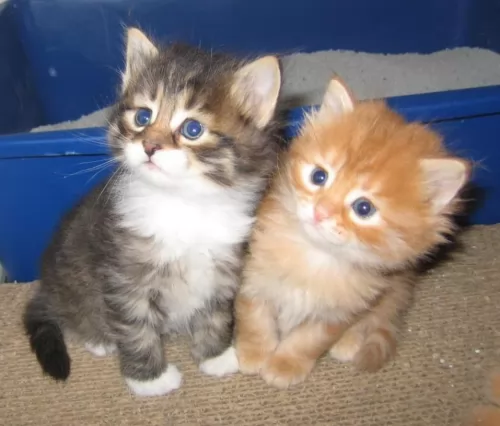 If you look after your Cymric well, he can live to a good age of up to 15 years. The lack of a tail is a genetic defect and the cat’s deformed spine can cause health problems including arthritis.
If you look after your Cymric well, he can live to a good age of up to 15 years. The lack of a tail is a genetic defect and the cat’s deformed spine can cause health problems including arthritis.
In fact, the cat’s lack of a tail causes some serious diseases. The defective gene responsible for the loss of the tail affects the spine and can actually cause spinal problems. In fact, when completely tailless Manx cats mate, the defects can be so severe that some of the offspring are born dead.
People often speak of these health issues of the cat as the Manx Syndrome.
Some cats have a narrowing of the anal passage and this can lead to bowel blockages. Make sure to get your Cymric vaccinated against deadly cat illnesses and ensure veterinary checks for parasite control and illness.
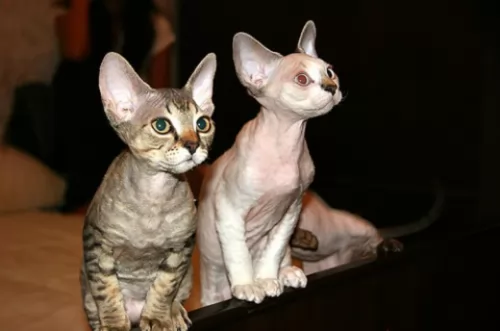 This particular cat isn’t known for any extreme health issues but even so, there are some health problems that are important to know about -
This particular cat isn’t known for any extreme health issues but even so, there are some health problems that are important to know about -
This is where the patella or knee cap moves out of its usual spot. It can occur because of a number of reasons such as an injury or congenital malformation. The vet will want x-rays because sometimes hip dysplasia is also present.
This is an inherited condition seen in both male and female cats and usually in young kittens. The cat has an odd gait with a head that bobs along as is tries to walk. The cat has tremors and also has difficulty with swallowing. With a visit to the vet and special care, your cat can do well.
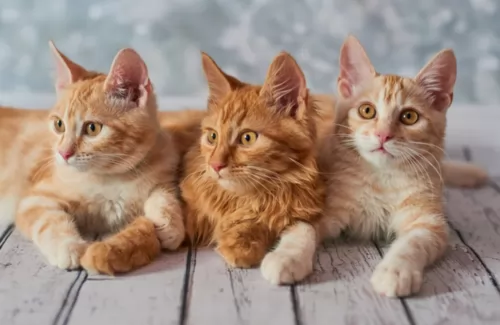 As a kitten, provide your Cymric with food appropriate to its age. Once your cat turns one, you can start feeding him adult cat food. There are a whole lot of excellent commercially manufactured cat foods – dry and canned foo – but always choose a high-quality one where the first ingredients listed are always meat. This is because the cat is a carnivore. Make sure the food has taurine, which is an essential amino acid for cats.
As a kitten, provide your Cymric with food appropriate to its age. Once your cat turns one, you can start feeding him adult cat food. There are a whole lot of excellent commercially manufactured cat foods – dry and canned foo – but always choose a high-quality one where the first ingredients listed are always meat. This is because the cat is a carnivore. Make sure the food has taurine, which is an essential amino acid for cats.
This cat has a thick coat and he will need a brush at least twice a week, especially as he is a high shedding cat. While you brush your cat, look out for any problems such as red areas, hair loss, sores or irritated skin. Take note of any unusual lumps.
Some people take their Cymric to the vet once a year for a routine medical check-up. They have the nails clipped and the ears and teeth checked. It is also a great way to get your queries answered on the nutritional and health needs of your pet.
You will need to have your Cymric’s nutrition checked to keep him in tip-top condition. The Cymric cat has a good appetite and his build can allow him to put on weight easily. Obesity can put pressure on the spine and lead to all kinds of joint problems.
Provide your cat with a litter box and keep it immaculately clean.
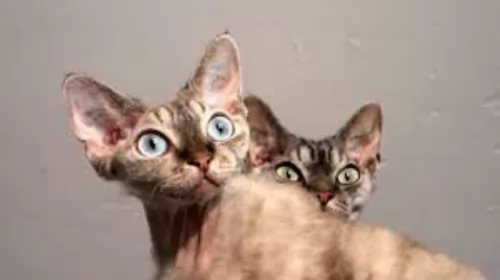 The Devon rex cat breed is known for its unusual looks with its wavy fur, large ears and large eyes. It is considered a rare breed and you want to make sure that you take proper care of him.
The Devon rex cat breed is known for its unusual looks with its wavy fur, large ears and large eyes. It is considered a rare breed and you want to make sure that you take proper care of him.
Owners of the Devon Rex know that these cats love their food and it has to be top quality food to enhance good feline health.
Cats are carnivores, ad this actually means that they should stick to a meat diet. Any food you buy your cat should be mainly meat. Look at the packaging of the commercially manufactured cat foods you want to buy, and make sure that the first few ingredients are some sort of meat.
Remember that any uncertainty with feeding your cat, you can chat with your vet.
Keep the inside of your cat’s ear free of an accumulation of wax and dirt as well as infection. If you don’t like the idea of probing in your cat’s ears, be in contact with your vet or a reputable, professional cat groomer.
Trim the cat’s nails.
Check inside his mouth for bad teeth as this could be causing him pain.
Clean your cat’s litter box every single day and also replace the grit regularly.
Get your cat veterinary care as soon as he shows signs of illness. Certainly, make sure all his vaccines and deworming are up to date.